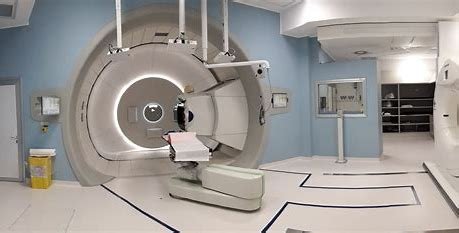Elekta and GE Healthcare collaborate to expand access to precision radiation therapy solutions
06 April 2022 | Wednesday | News

Image Source : Public Domain
As hospitals increasingly seek flexible and interoperable simulation and guidance technology, Elekta and GE Healthcare aim to meet the major need for radiotherapy solutions across both developed and developing markets.
As many as 50–60 percent of all cancer patients require radiation therapy[1] which requires high quality imaging and sophisticated delivery equipment and software to precisely target tumors while sparing healthy tissue. Precision imaging is fundamental to determining the size, shape and characteristics of tumors and differentiating between healthy tissues. Delivering the most appropriate dose requires advanced patient positioning, motion management technologies and state-of-the-art techniques such as VMAT[2] or SBRT[3]. Combining GE Healthcare's imaging solutions with Elekta's radiation therapy solutions will result in an even more compelling offering for hospitals.
Elekta CEO, Gustaf Salford, said: "We are driven by our customers' preferences and their need for comprehensive solutions in effective, efficient and safe cancer care. Therefore, we're excited about this collaboration with GE Healthcare. We have many mutual customers who see clear synergies and advantages with our respective, strong product portfolios. This will allow us to jointly promote the most optimal solutions for each cancer center's needs. Elekta strives to assure that customers can create seamless ecosystems that facilitate efficient end-to-end cancer care."
"Access to radiation therapy is a significant challenge in several parts of the globe. We are pleased that this collaboration is a step in the right direction to make more comprehensive solutions more readily available," said Jan Makela, President & CEO GE Healthcare Imaging. "Cancer care can only be improved if players in the field work together and this is one of several partnerships that we are pursuing, for the benefit of caregivers and patients, as we build out our Oncology offerings."
GE Healthcare and Elekta will continue to offer their own solutions using standard interfaces and facilitate interoperability with any vendor's systems.
The agreement is non-exclusive, meaning each party can continue to cooperate with other partners. Separately, both companies are eager to explore opportunities to improve interoperability and streamline workflows in radiation oncology.
Most Read
- How Does GLP-1 Work?
- Innovations In Magnetic Resonance Imaging Introduced By United Imaging
- Management of Relapsed/Refractory Multiple Myeloma
- 2025 Drug Approvals, Decoded: What Every Biopharma Leader Needs to Know
- BioPharma Manufacturing Resilience: Lessons From Capacity Expansion and Supply Chain Resets from 2025
- APAC Biopharma Review 2025: Innovation, Investment, and Influence on the Global Stage
- Top 25 Biotech Innovations Redefining Health And Planet In 2025
- The New AI Gold Rush: Western Pharma’s Billion-Dollar Bet on Chinese Biotech
- Single-Use Systems Are Rewiring Biopharma Manufacturing
- The State of Biotech and Life Science Jobs in Asia Pacific – 2025
- Asia-Pacific Leads the Charge: Latest Global BioSupplier Technologies of 2025
- Invisible Threats, Visible Risks: How the Nitrosamine Crisis Reshaped Asia’s Pharmaceutical Quality Landscape
Bio Jobs
- Sanofi Turns The Page As Belén Garijo Steps In And Paul Hudson Steps Out
- Global Survey Reveals Nearly 40% of Employees Facing Fertility Challenges Consider Leaving Their Jobs
- BioMed X and AbbVie Begin Global Search for Bold Neuroscience Talent To Decode the Biology of Anhedonia
- Thermo Fisher Expands Bengaluru R&D Centre to Advance Antibody Innovation and Strengthen India’s Life Sciences Ecosystem
- Accord Plasma (Intas Group) Acquires Prothya Biosolutions to Expand Global Plasma Capabilities
- ACG Announces $200 Million Investment to Establish First U.S. Capsule Manufacturing Facility in Atlanta
- AstraZeneca Invests $4.5 Billion to Build Advanced Manufacturing Facility in Virginia, Expanding U.S. Medicine Production
News











